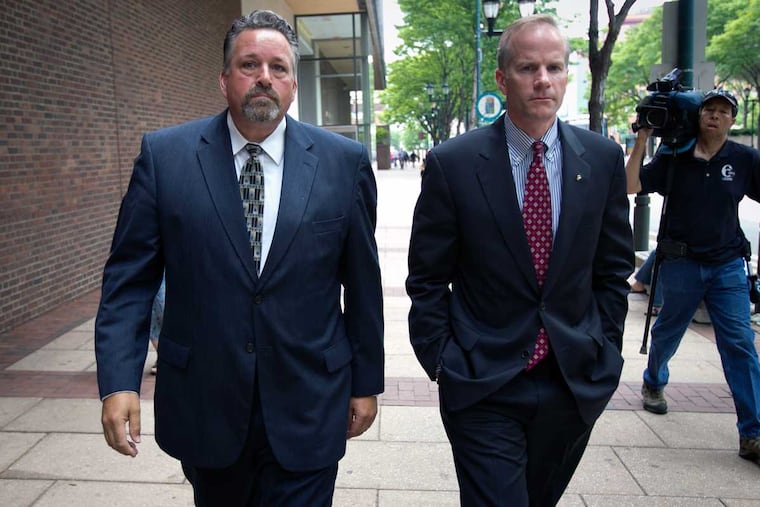William McSwain emerges as leading candidate for US Attorney in Philadelphia
William McSwain, a partner at Drinker Biddle & Reath and a former federal prosecutor, has emerged as the leading candidate to become the U.S. Attorney in Philadelphia, earning support from Sens. Pat Toomey and Bob Casey, according to multiple sources. Cumberland County district attorney Dave Freed has the senators' backing to become U.S. Attorney for Pennsylvania's Middle District.

WASHINGTON — William McSwain, a partner at the Center City law firm Drinker Biddle & Reath and a former federal prosecutor, has emerged as the leading candidate to become the U.S. attorney in Philadelphia, according to three sources familiar with the process.
McSwain, who previously worked as an assistant U.S. attorney in the Philadelphia office, has support from Pennsylvania Sens. Pat Toomey and Bob Casey, two of the sources said, though he is still being vetted by the Trump administration.
In the Middle District of Pennsylvania, two sources said, the leading contender is David Freed, the Cumberland County district attorney who ran for state attorney general in 2012, losing to Kathleen Kane. He also has support from Pennsylvania's senators but is awaiting White House approval.
Appointees to either post would become leading faces of federal law enforcement in Pennsylvania, with vast powers to decide which crimes get investigated and prosecuted. They would work closely with agencies including the FBI, DEA, and IRS while pursuing crimes ranging from terrorism to public corruption to major financial fraud and drug trafficking.
Such positions are often political springboards. Gov. Christie rose to prominence as New Jersey's U.S. attorney, as did Michael Chertoff, who went on to become head of the Department of Homeland Security. One former U.S. attorney from the Philadelphia-based Eastern District of Pennsylvania, Pat Meehan, is now a congressman.
The sources who discussed the search did so on the condition of anonymity because the vetting is private and still ongoing.
Pennsylvania's Eastern District includes Philadelphia and Berks, Bucks, Chester, Delaware, Lancaster, Lehigh, Montgomery, and Northampton Counties.
The names have begun to trickle out though President Trump has yet to nominate anyone for a U.S. attorney post, despite ordering 46 of them to turn in their resignations in March, purging nearly all of the remaining holdovers from the Obama administration.
The previous U.S. attorney in Philadelphia, Zane Memeger, had left his post in December. Louis Lappen has since served as the office's acting U.S. attorney.
New Jersey's U.S. attorney positions also remain vacant, with political insiders saying there is a struggle on between Christie and Trump son-in-law Jared Kushner over who will get the nod.
It's not unusual for such nominations to drag on. It took more than a year for President Barack Obama to name his pick for Pennsylvania's Eastern District. His first formal batch of U.S. attorney nominations, including his choice in New Jersey, arrived on June 4 of his first year in office. But Obama also did not remove so many en masse.
Ex-prosecutors said the professional staffs can keep those offices running smoothly, even without a U.S. attorney formally nominated and confirmed.
"We had an acting U.S. attorney almost my entire time there," said Jeffery Lindy, a federal prosecutor in Philadelphia from 1989 to 1992. "It doesn't affect the day-to-day workings of the office."
Lee Vartan, who worked under Christie, agreed when it comes to daily operations, but said acting U.S. attorneys are less likely to shape new priorities and refocus the offices.
"The most important role of a U.S. attorney, in my view, is to come in and focus the office in a particular direction or directions, and that doesn't happen under an acting U.S. attorney," Vartan said.
Christie, for example, brought an intense focus on public corruption cases. His successor was more centered on white-collar crime, Vartan said. Lindy said direction ultimately will come from Attorney General Jeff Sessions, who he expects to emphasize drug and gun crimes.
Neither Toomey's nor Casey's office, nor the White House, would comment on the potential Pennsylvania nominations. McSwain and Freed also declined to comment.
McSwain, from West Chester, is well-known to key Pennsylvania Republicans. He worked under Meehan in the U.S. Attorney's Office and advises Toomey and Rep. Ryan Costello, of Chester County, on their selections for service academy recommendations.
He has also donated thousands in recent years to all three of their political funds — including $6,400 to Toomey's 2016 reelection campaign and a related joint fund-raising committee, according to campaign filings. He did not make any contributions to President Trump, but did give $1,500 to one Trump rival, Jeb Bush, and donated to Mitt Romney in 2012.
A former Marine infantry officer, McSwain, 48, went to law school at Harvard, where was an editor of the Law Review, and worked in the Eastern District's criminal division from 2003 to 2006. He has since worked as a white-collar criminal defense lawyer, including defending a Chester County magistrate judge accused in the Philadelphia ticket-fixing scandal. The judge, Mark Bruno, was acquitted on all charges.
He also represented the Boy Scouts in a 2010 dispute with Philadelphia over the group's use of office space on city land because the national organization then banned gay scouts.
Freed, 46, went to Dickinson Law School and has been the Cumberland County district attorney since 2006.
U.S. attorney posts pay up to $161,800 per year.
Toomey and Casey have said they will continue the tradition in which Pennsylvania's two senators, often from opposing parties, work together to recommend key federal nominees, though it is not clear if the Trump administration plans to give deference to their choices.